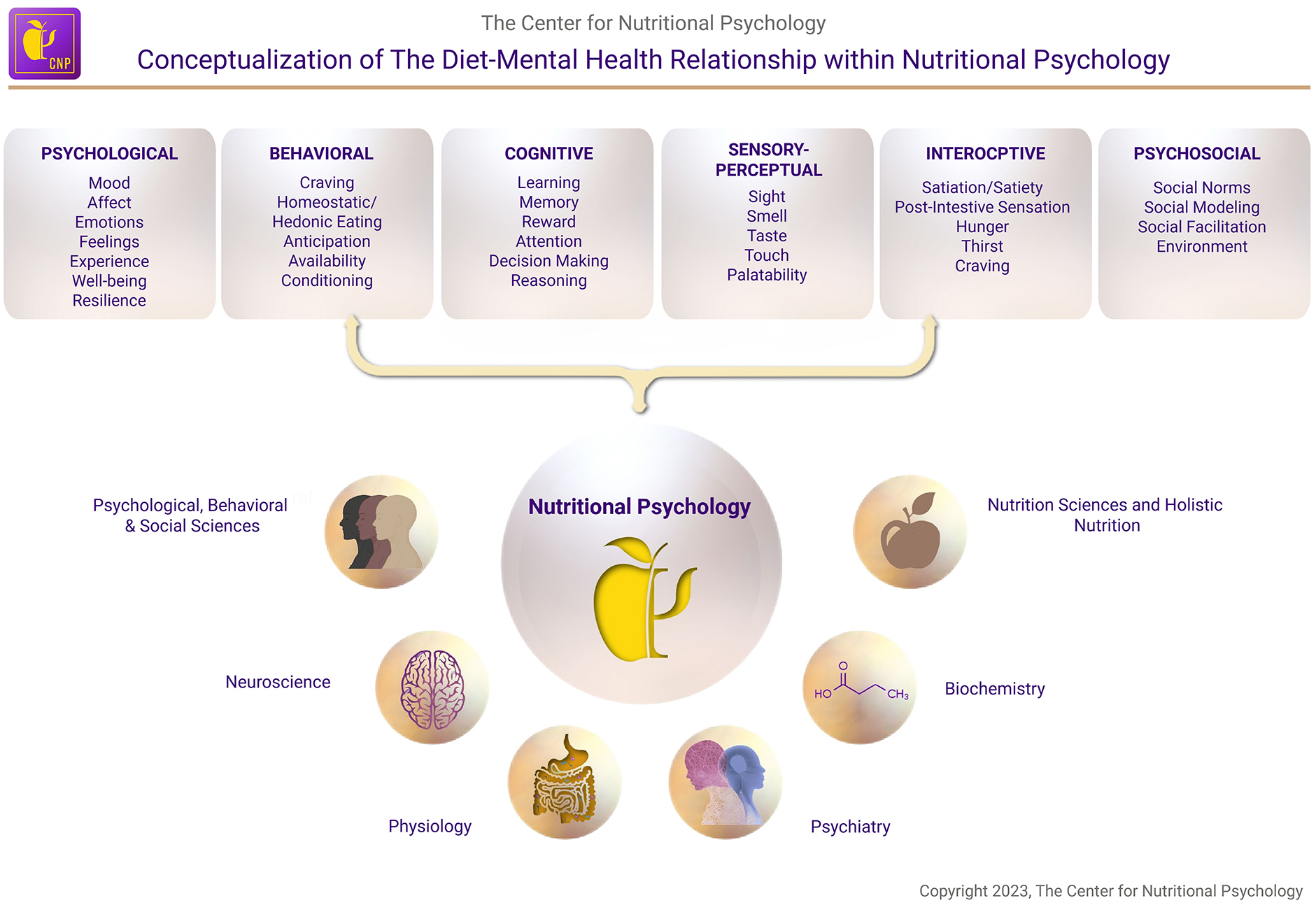What is Nutritional Psychology?
The Center for Nutritional Psychology (CNP) is dedicated towards developing the field of Nutritional Psychology. Nutritional Psychology (NP) is a burgeoning interdisciplinary scientific area of study exploring the mechanisms underlying the interconnections between diet and human psychological, behavioral, cognitive, sensory-perceptual, interoceptive, social, and neurodevelopmental processes, experiences, and outcomes.
NP is interdisciplinary, synthesizing insights from the disciplines of psychology, behavioral and social sciences, nutrition science, neuroscience, biochemistry, physiology, and psychiatry. Leveraging these diverse disciplines facilitates the development of innovative languages, concepts, and methodologies that seamlessly integrate into the broader area of specialty within the psychological sciences.
Each discipline considered within the scope of NP is viewed through the lens of the diet-mental health relationship (DMHR) —an umbrella term used within NP. This involves examining findings from each discipline to inform our understanding of how diet influences all aspects of psychological functioning, processes, experience, and outcomes to shape how we think, feel, act, sense, and experience the world around us.
The “DMHR” serves as a convenient shorthand for conveying the intricate relationship between diet and all components encompassed within NP. Such conceptual frameworks, including the DMHR, facilitate the development of a novel language to effectively communicate NP concepts within academic and clinical settings.
Nutritional Psychology constitutes an intricate synthesis of essential disciplines. By incorporating psychological, behavioral, and social components, alongside the enlightening realms of neuroscience, physiology, psychiatry, biochemistry, nutrition sciences, and holistic nutrition. This multidimensional field endeavors to discern the connections that interlink our dietary choices with our mental well-being.
Let’s delve into how each of these disciplines informs the field and grasp the understanding of its multidimensional significance.




Psychological, Behavioral, and Social Sciences Components of Nutritional Psychology
At its core, Psychology explores the intricate workings of the human mind and behavior, delving into the realms of cognition, emotion, mood, and perception to unravel the complex interplay between our thoughts, feelings, senses, and actions. Through the lens of psychology, NP examines the interconnections between our dietary intake and mental well-being, meticulously scrutinizing the profound impact that specific nutrients and dietary patterns exert on our mood, emotions, cognition, and emotions. This includes delving into the psychological, affective, and emotional aspects of food and eating behavior, encompassing food preferences, emotional eating, body perception, eating disorders, and the psychological implications stemming from diverse dietary patterns. NP also explores how social factors, such as cultural upbringing, prevailing societal norms, and personal beliefs, intricately shape our food choices, dietary intake patterns, and our underlying cognitive frameworks and behavioral responses towards nutrition.


Nutrition Sciences Component of Nutritional Psychology
At its core, Nutritional Sciences delve into the intricate workings of the human body and its physiological processes, exploring the complex interplay between nutrients, metabolism, and health outcomes. Through the lens of nutritional sciences, this facet of NP unravels the profound impact that specific nutrients, dietary patterns, and food choices exert on all aspects of our DMHR— including our cognitive processes and functions, mood regulation, and emotional well-being. This includes delving into the physiological, biochemical, and metabolic aspects of food and eating behavior, encompassing the relationships between nutrients and mood, cognitive performance, body composition, eating disorders, and the physiological implications stemming from diverse dietary choices. By synthesizing the empirical knowledge from the nutrition sciences within the broader scope of NP, researchers can illuminate the complex nexus between diet, nutrition, and mental well-being, paving the way for targeted interventions and personalized approaches to optimize mental health outcomes.


Neuroscience Component of Nutritional Psychology
At its core, Neuroscience delves into the intricate workings of the human brain and nervous system, exploring the complex interplay between neural processes, cognition, perception, and behavior. Through the lens of neuroscience, NP meticulously examines the profound impact that specific brain mechanisms and neural pathways exert on our mental states, emotions, and cognitive functions in relation to nutrition. This includes delving into the neurobiological, affective, and emotional aspects of food and eating behavior, encompassing neural correlates of food preferences, emotional eating, body perception, eating disorders, and the neuroscientific implications stemming from diverse dietary patterns. NP also explores how neurobiological and behavioral factors, such as neural circuitry, neurochemicals, stress response systems, genetic predispositions, cultural influences, and personal experiences, intricately shape our food choices, dietary intake patterns, and the underlying neural frameworks and behavioral responses towards nutrition.


Biochemical Component of Nutritional Psychology
At its core, Biochemistry unravels the intricate molecular processes occurring within living organisms, shedding light on the complex interplay between biochemical reactions, cellular metabolism, and physiological functions. Through a biochemically-oriented lens, NP meticulously delves into the molecular and cellular aspects of food and eating behavior, encompassing the biochemical factors underlying food preferences, emotional eating, body metabolism, nutrient deficiencies, and the biochemical implications arising from diverse dietary patterns. NP also explores how biochemical and physiological factors, such as enzyme activities, hormone levels, nutrient absorption, genetic variations, metabolic responses, and cellular signaling, intricately shape our food choices, dietary intake patterns, and the underlying biochemical frameworks and physiological responses towards nutrition. Understanding the intricate interplay between biochemistry and mental health within the context of nutrition provides valuable insights for developing targeted interventions and personalized dietary strategies to optimize mental well-being and promote psychological resilience within the purview of NP, lending insight into the DMHR.


Physiological Component of Nutritional Psychology
At its core, Physiology delves into the intricate workings of the human body, exploring the physiological processes that govern various bodily systems and functions. Through the lens of Physiology, NP intricately examines the interconnections between our dietary intake and physiological well-being, meticulously scrutinizing the profound influence that specific nutrients and dietary habits exert on our bodily processes, metabolism, and overall well-being. NP also explores physiological responses to dietary constituents like vitamins, minerals, amino acids, and fatty acids, examining their impact on neurotransmitter function, hormonal regulation, and brain structure—revealing their roles in mood, cognition, and emotional states. Additionally, NP scrutinizes the physiological consequences of disordered eating patterns, from malnutrition to overconsumption, and their psychological implications. Deepening our knowledge in this domain fosters informed approaches to mental health, integrating nutrition, and enhancing our understanding of the DMHR.


Psychiatric component of Nutritional Psychology
At its core, Psychiatry delves into the diagnosis, treatment, and prevention of mental, emotional, and behavioral disorders, utilizing various therapeutic interventions to aid individuals with clinical mental health conditions. Through the lens of psychiatry, nutritional psychology augments the burgeoning field of Nutritional Psychiatry by expanding its purview to encompass a broader array of disciplines within the psychological, behavioral, and social sciences. This entails delving into the intricate interplay between diet and nutrients with human emotion, behavior, sensory and perception, cognition, performance, and psychosocial and interoceptive experience. Through these fields, a more comprehensive understanding of the intricate connections between nutrition and all aspects of the diet-mental health relationship emerges, fostering the development of more effective strategies that complement traditional psychiatric treatments and increasing our understanding of the myriad factors at play within our DMHR.




In conclusion, the field of NP emerges as a comprehensive discipline that combines diverse multidisciplinary approaches and integrates their valuable insights into a cohesive framework. Through this integration, NP unravels the intricate connections and interrelationships among different disciplines, leading to a deeper comprehension of the mind-body connection. NP enhances our understanding by unraveling the complex interplay between nutrients, brain chemistry, and behavior and opens doors for evidence-based interventions and dietary strategies. These advancements offer promising avenues for improving human psychological, cognitive, and behavioral processes and fostering better mental health outcomes in the future.
What is the evidence for Nutritional Psychology?
While research in the actual term “nutritional psychology” itself does not yet exist, the field is informed by a robust evidence base of thousands of existing studies spanning the purview of nutritional psychology, including the psychological, behavioral, social, nutrition, and dietetic, brain, and health sciences. Links to these studies are housed in the Nutritional Psychology Research Library (NPRL) and inform the development of new language, tools, concepts, and methods characterizing the diet-mental health relationship within nutritional psychology3, 4.
The areas of study included within nutritional psychology include emotion5, 6, behavior7-10, psychological functioning, mood, and well-being11-18, cognition and brain19-23, sensation, perception, and internal experience (interoception)24-31, stress, distress, resilience, and quality of life32-36, pain and pleasure37-41, dietary intake regulation and substance use42-45, aggression, violence, and trauma46-48, sleep, fatigue, and performance49-55, psychosocial environment and lifestyle56-59, and personality60, 61.
References
- The Nutritional Psychology Research Library (NPRL). The Center for Nutritional Psychology. https://www.nutritional-psychology.org/library-introduction/
- Deligiannidou, G.-E., Philippou, E., Vasiari, E., Lopes de Andrade, V., Massaro, M., Chervenkov, M., Ivanova, T., Jorge, R., Dimitrova, D., Ruskovska, T., & et al. (2024). Exploring the relationship between Mediterranean diet adherence and subjective well-being among Greek and Cypriot adults. Nutrients, 16(8), 1238. https://doi.org/10.3390/nu16081238
- Zhang, X., Wang, H., Kilpatrick, L. A., Dong, T. S., Gee, G. C., Labus, J. S., Osadchiy, V., Beltran-Sanchez, H., Wang, M. C., Vaughan, A., & Gupta, A. (2023). Discrimination exposure impacts unhealthy processing of food cues: crosstalk between the brain and gut. Nature mental health, 1(11), 841–852. https://doi.org/10.1038/s44220-023-00134-9
- Swami, V., Hochstöger, S., Kargl, E., & Stieger, S. (2022). Hangry in the field: An experience sampling study on the impact of hunger on anger, irritability, and affect. PloS one, 17(7), e0269629. https://doi.org/10.1371/journal.pone.0269629
- Zhang, L., Sun, H., Liu, Z., Yang, J., & Liu, Y. (2024). Association between dietary sugar intake and depression in US adults: a cross-sectional study using data from the National Health and Nutrition Examination Survey 2011-2018. BMC psychiatry, 24(1), 110. https://doi.org/10.1186/s12888-024-05531-7
- The Center for Nutritional Psychology (Retrieved Sept. 15, 2022). https://www.nutritional-psychology.org.
- Introduction to the Nutritional Psychology Research Libraries (NPRL). The Center for Nutritional Psychology. https://www.nutritional-psychology.org/library-introduction/
- The Center for Nutritional Psychology (Retrieved Sept. 15, 2022). https://www.nutritional-psychology.org/educations/
- Devonport, T. J., Nicholls, W., & Fullerton, C. (2019). A systematic review of the association between emotions and eating behaviour in normal and overweight adult populations.Journal of health psychology, 24(1), 3–24. https://doi.org/10.1177/1359105317697813
- Altheimer, G., Giles, G. E., Remedios, J. D., Kanarek, R. B., & Urry, H. L. (2021). Do emotions predict eating? The role of previous experiences in emotional eating in the lab and in daily life.Appetite, 158, 105016. https://doi.org/10.1016/j.appet.2020.105016
- Ma, X., Chen, Q., Pu, Y., Guo, M., Jiang, Z., Huang, W., Long, Y., & Xu, Y. (2020). Skipping breakfast is associated with overweight and obesity: A systematic review and meta-analysis. Obesity research & clinical practice, 14(1), 1–8.
- Elliston, K. G., Ferguson, S. G., Schüz, N., & Schüz, B. (2017). Situational cues and momentary food environment predict everyday eating behavior in adults with overweight and obesity. Health psychology: Official journal of the Division of Health Psychology, American Psychological Association, 36(4), 337–345.
- Burger, K. S., Sanders, A. J., & Gilbert, J. R. (2016). Hedonic hunger is related to increased neural and perceptual responses to cues of palatable food and motivation to consume: Evidence from 3 independent investigations. The Journal of nutrition, 146(9), 1807–1812.
- Reents, J., Seidel, A. K., Wiesner, C. D., & Pedersen, A. (2020). The effect of hunger and satiety on mood-related food craving. Frontiers in psychology, 11, 568908.
- Sun, W., & Kober, H. (2020). Regulating food craving: From mechanisms to interventions. Physiology & behavior, 222, 112878.
- Bayes, J., Schloss, J., & Sibbritt, D. (2022). The effect of a Mediterranean diet on the symptoms of depression in young males (the “AMMEND: A Mediterranean Diet in MEN with Depression” study): a randomized controlled trial.The American journal of clinical nutrition, 116(2), 572–580.
- Głąbska, D., Guzek, D., Groele, B., & Gutkowska, K. (2020). Fruit and vegetables intake in adolescents and mental health: a systematic review.Roczniki Panstwowego Zakladu Higieny, 71(1), 15–25.
- Fatahi, S., Matin, S. S., Sohouli, M. H., Găman, M. A., Raee, P., Olang, B., Kathirgamathamby, V., Santos, H. O., Guimarães, N. S., & Shidfar, F. (2021). Association of dietary fiber and depression symptom: A systematic review and meta-analysis of observational studies. Complementary therapies in medicine, 56, 102621.
- Boehm, J. K., Soo, J., Zevon, E. S., Chen, Y., Kim, E. S., & Kubzansky, L. D. (2018). Longitudinal associations between psychological well-being and the consumption of fruits and vegetables.Health psychology: official journal of the Division of Health Psychology, American Psychological Association, 37(10), 959–967.
- De Leon, A., Jahns, L., Roemmich, J. N., Duke, S. E., & Casperson, S. L. (2022). Consumption of dietary guidelines for Americans types and amounts of vegetables increases mean subjective Happiness Scale scores: A randomized controlled trial. Journal of the Academy of Nutrition and Dietetics, 122(7), 1355–1362. https://doi.org/10.1016/j.jand.2021.11.009
- Swami, V., Hochstöger, S., Kargl, E., & Stieger, S. (2022). Hangry in the field: An experience sampling study on the impact of hunger on anger, irritability, and affect.PloS one, 17(7), e0269629.
- McMartin, S. E., Willows, N. D., Colman, I., Ohinmaa, A., Storey, K., & Veugelers, P. J. (2013). Diet quality and feelings of worry, sadness or unhappiness in Canadian children.Canadian journal of public health = Revue canadienne de sante publique, 104(4), e322–e326.
- Zhang, J., Zhao, A., Wu, W., Yang, C., Ren, Z., Wang, M., Wang, P., & Zhang, Y. (2020). Dietary diversity is associated with memory status in Chinese adults: A prospective study.Frontiers in aging neuroscience, 12, 580760. https://doi.org/10.3389/fnagi.2020.580760
- Coccurello, R., & Maccarrone, M. (2018). Hedonic eating and the “Delicious Circle”: From lipid-derived mediators to brain dopamine and back.Frontiers in neuroscience, 12, 271. https://doi.org/10.3389/fnins.2018.00271
- Hepsomali, P., Greyling, A., Scholey, A., & Vauzour, D. (2021). Acute effects of polyphenols on human attentional processes: A systematic review and meta-analysis. Frontiers in neuroscience, 15, 678769.
- Zhang, F., Yin, X., Liu, Y., Li, M., Gui, X., & Bi, C. (2022). Association between sugar-sweetened beverage consumption and executive function among Chinese Tibetan adolescents at high altitude. Frontiers in nutrition, 9, 939256.
- Beecher, K., Alvarez Cooper, I., Wang, J., Walters, S. B., Chehrehasa, F., Bartlett, S. E., & Belmer, A. (2021). Long-term overconsumption of sugar starting at adolescence produces persistent hyperactivity and neurocognitive deficits in adulthood. Frontiers in neuroscience, 15, 670430.
- Duerlund, M., Andersen, B. V., Wang, K., Chan, R., & Byrne, D. V. (2020). Post-ingestive sensations driving post-ingestive food pleasure: A cross-cultural consumer study comparing Denmark and China.Foods (Basel, Switzerland), 9(5), 617.
- Proserpio, C., Invitti, C., Boesveldt, S., Pasqualinotto, L., Laureati, M., Cattaneo, C., & Pagliarini, E. (2019). Ambient odor exposure affects food intake and sensory specific appetite in obese women. Frontiers in psychology, 10, 7.
- Spence, C., Okajima, K., Cheok, A. D., Petit, O., & Michel, C. (2016). Eating with our eyes: From visual hunger to digital satiation. Brain and cognition, 110, 53–63.
- Duerlund, M., Andersen, B. V., Alexi, N., Peng, M., & Byrne, D. V. (2020). Subjective sensations related to food as determinants of snack choice.Foods (Basel, Switzerland), 9(3), 336.
- Park, C., Pagnini, F., & Langer, E. (2020). Glucose metabolism responds to perceived sugar intake more than actual sugar intake.Scientific reports, 10(1), 15633.
- Hendriks, A., Nederkoorn, C., van Lier, I., van Belkom, B., Bast, A., & Havermans, R. C. (2021). Sensory-specific satiety, the variety effect and physical context: Does change of context during a meal enhance food intake?. Appetite, 163, 105179.
- Robinson, E., Marty, L., Higgs, S., & Jones, A. (2021). Interoception, eating behaviour and body weight. Physiology & behavior, 237, 113434. https://doi.org/10.1016/j.physbeh.2021.113434
- Young, H. A., Williams, C., Pink, A. E., Freegard, G., Owens, A., & Benton, D. (2017). Getting to the heart of the matter: Does aberrant interoceptive processing contribute towards emotional eating?.PloS one, 12(10), e0186312. https://doi.org/10.1371/journal.pone.0186312
- Radavelli-Bagatini, S., Blekkenhorst, L. C., Sim, M., Prince, R. L., Bondonno, N. P., Bondonno, C. P., Woodman, R., Anokye, R., Dimmock, J., Jackson, B., Costello, L., Devine, A., Stanley, M. J., Dickson, J. M., Magliano, D. J., Shaw, J. E., Daly, R. M., Hodgson, J. M., & Lewis, J. R. (2021). Fruit and vegetable intake is inversely associated with perceived stress across the adult lifespan.Clinical nutrition (Edinburgh, Scotland), 40(5), 2860–2867.
- Kleppang, A. L., de Ridder, K., Haugland, S. H., & Stea, T. H. (2021). Physical activity, sugar-sweetened beverages, whole grain bread and insomnia among adolescents and psychological distress in adulthood: prospective data from the population-based HUNT study. The international journal of behavioral nutrition and physical activity, 18(1), 143.
- Yin, Z., Brasher, M. S., Kraus, V. B., Lv, Y., Shi, X., & Zeng, Y. (2019). Dietary diversity was positively associated with psychological resilience among elders: A population-based study.Nutrients, 11(3), 650.
- Romero-Robles, M. A., Ccami-Bernal, F., Ortiz-Benique, Z. N., Pinto-Ruiz, D. F., Benites-Zapata, V. A., & Casas Patiño, D. (2022). Adherence to Mediterranean diet associated with health-related quality of life in children and adolescents: a systematic review.BMC nutrition, 8(1), 57. https://doi.org/10.1186/s40795-022-00549-0
- Whatnall, M. C., Patterson, A. J., Siew, Y. Y., Kay-Lambkin, F., & Hutchesson, M. J. (2019). Are psychological distress and resilience associated with dietary intake among Australian university students?. International journal of environmental research and public health, 16(21), 4099.
- Elma, Ö., Yilmaz, S. T., Deliens, T., Coppieters, I., Clarys, P., Nijs, J., & Malfliet, A. (2020). Do nutritional factors interact with chronic musculoskeletal pain? A systematic review.Journal of clinical medicine, 9(3), 702.
- Lin, Y., De Araujo, I., Stanley, G., Small, D., & Geha, P. (2022). Chronic pain precedes disrupted eating behavior in low-back pain patients.PloS one, 17(2), e0263527. https://doi.org/10.1371/journal.pone.0263527
- Bjørklund, G., Aaseth, J., Doşa, M. D., Pivina, L., Dadar, M., Pen, J. J., & Chirumbolo, S. (2019). Does diet play a role in reducing nociception related to inflammation and chronic pain?. Nutrition (Burbank, Los Angeles County, Calif.), 66, 153–165. https://doi.org/10.1016/j.nut.2019.04.007
- Strath, L. J., Brooks, M. S., Sorge, R. E., & Judd, S. E. (2022). Relationship between diet and relative risk of pain in a cross-sectional analysis of the REGARDS longitudinal study. Pain management, 12(2), 168–179. https://doi.org/10.2217/pmt-2021-0048
- Landry, M., Lemieux, S., Lapointe, A., Bédard, A., Bélanger-Gravel, A., Bégin, C., Provencher, V., & Desroches, S. (2018). Is eating pleasure compatible with healthy eating? A qualitative study on Quebecers’ perceptions. Appetite, 125, 537–547.
- Schulte, E. M., Sonneville, K. R., & Gearhardt, A. N. (2019). Subjective experiences of highly processed food consumption in individuals with food addiction.Psychology of addictive behaviors: journal of the Society of Psychologists in Addictive Behaviors, 33(2), 144–153.
- Rolland, B., Haesebaert, F., Zante, E., Benyamina, A., Haesebaert, J., & Franck, N. (2020). Global changes and factors of increase in caloric/salty food intake, screen use, and substance use during the early COVID-19 containment phase in the general population in France: Survey study. JMIR public health and surveillance, 6(3), e19630.
- Witek, K., Wydra, K., & Filip, M. (2022). A high-sugar diet consumption, metabolism and health impacts with a focus on the development of Substance Use Disorder: A narrative Review.Nutrients, 14(14), 2940. https://doi.org/10.3390/nu14142940
- Hayek, J., Schneider, F., Tueni, M., & de Vries, H. (2020). Is academic achievement related to Mediterranean Diet, substance use and social-cognitive factors: Findings from Lebanese adolescents.Nutrients, 12(5), 1535. https://doi.org/10.3390/nu12051535
- Jackson, D. B., & Vaughn, M. G. (2021). Diet quality and physical fighting among youth: A cross-national study.Journal of interpersonal violence, 36(3-4), NP1180–1192NP.
- Liang, K., Chi, X., Chen, S. T., Clark, C., Zhang, Y., & Wang, J. (2021). Food insecurity and bullying victimization among 170,618 adolescents in 59 countries.Frontiers in psychiatry, 12, 766804. https://doi.org/10.3389/fpsyt.2021.766804
- Kim, Y., Roberts, A. L., Rimm, E. B., Chibnik, L. B., Tworoger, S. S., Nishimi, K. M., Sumner, J. A., Koenen, K. C., & Kubzansky, L. D. (2021). Posttraumatic stress disorder and changes in diet quality over 20 years among US women.Psychological medicine, 51(2), 310–319.
- Zuraikat, F. M., Makarem, N., Liao, M., St-Onge, M. P., & Aggarwal, B. (2020). Measures of poor sleep quality are associated with higher energy intake and poor diet quality in a diverse sample of women from the Go Red for Women Strategically Focused Research Network.Journal of the American Heart Association, 9(4), e014587.
- Azzolino, D., Arosio, B., Marzetti, E., Calvani, R., & Cesari, M. (2020). Nutritional status as a mediator of fatigue and its underlying mechanisms in older people.Nutrients, 12(2), 444.
- Martins, A. J., Martini, L. A., & Moreno, C. (2019). Prudent diet is associated with low sleepiness among short-haul truck drivers.Nutrition (Burbank, Los Angeles County, Calif.), 63-64, 61–68.
- Ge, Y., He, S., Xu, Y., & Qu, W. (2021). Effects of dietary patterns on driving behaviours among professional truck drivers: the mediating effect of fatigue. Occupational and environmental medicine, 78(9), 669–675. https://doi.org/10.1136/oemed-2020-107206
- Whatnall, M. C., Patterson, A. J., Burrows, T. L., & Hutchesson, M. J. (2019). Higher diet quality in university students is associated with higher academic achievement: a cross-sectional study.Journal of human nutrition and dietetics: the official journal of the British Dietetic Association, 32(3), 321–328. https://doi.org/10.1111/jhn.12632
- Leedo, E., Beck, A. M., Astrup, A., & Lassen, A. D. (2017). The effectiveness of healthy meals at work on reaction time, mood and dietary intake: a randomised cross-over study in daytime and shift workers at an university hospital.The British journal of nutrition, 118(2), 121–129. https://doi.org/10.1017/S000711451700191X
- Virtanen, J., Penttinen, M. A., Laaksonen, M., Erkkola, M., Vepsäläinen, H., Kautiainen, H., & Korhonen, P. (2022). The relationship between dietary habits and work engagement among female Finnish municipal employees.Nutrients, 14(6), 1267. https://doi.org/10.3390/nu14061267
- Strang, S., Hoeber, C., Uhl, O., Koletzko, B., Münte, T. F., Lehnert, H., Dolan, R. J., Schmid, S. M., & Park, S. Q. (2017). Impact of nutrition on social decision making. Proceedings of the National Academy of Sciences of the United States of America, 114(25), 6510–6514.
- Chae, W., Ju, Y. J., Shin, J., Jang, S. I., & Park, E. C. (2018). Association between eating behaviour and diet quality: eating alone vs. eating with others. Nutrition journal, 17(1), 117.
- Ruddock, H. K., Brunstrom, J. M., & Higgs, S. (2021). The social facilitation of eating: why does the mere presence of others cause an increase in energy intake?.Physiology & behavior, 240, 113539. https://doi.org/10.1016/j.physbeh.2021.113539
- Milliron, B. J., Ward, D., Granche, J., Mensinger, J., Stott, D., Chenault, C., Montalto, F., & Ellis, E. V. (2022). Nature relatedness is positively associated with dietary diversity and fruit and vegetable intake in an urban population.American journal of health promotion: AJHP, 36(6), 1019–1024.
- Spence C. (2021). What is the link between personality and food behavior?.Current research in food science, 5, 19–27.
- Ait-Hadad, W., Bénard, M., Shankland, R., Kesse-Guyot, E., Robert, M., Touvier, M., Hercberg, S., Buscail, C., & Péneau, S. (2020). Optimism is associated with diet quality, food group consumption and snacking behavior in a general population.Nutrition journal, 19(1), 6. https://doi.org/10.1186/s12937-020-0522-7
HOW MUCH DOES A NUTRITIONAL PSYCHOLOGIST MAKE AND HOW DO I BECOME ONE?
A Field Guide to Nutritional Psychology: Salary, Education, and More

The Nutritional Psychology Research Library contains the evidence…
We are identifying, consolidating, categorizing and summarizing the world’s research in how diet influences psychological functioning, experience and mental health in the Nutritional Psychology Research Library (NPRL)
Studies show that increased consumption of high nutrient foods can positively impact the symptoms and occurrence of mental health disorders.
Read More






Studies show that consumption of processed, sugary, low-nutrient foods can negatively impacting mental health.
Read More


What kinds of questions are explored in Nutritional Psychology?
JOIN OUR COMMUNITY
Take steps to develop your understanding of the relationship between diet and mental health. Together, we can build a new model of mental healthcare to include this important piece of the puzzle.
